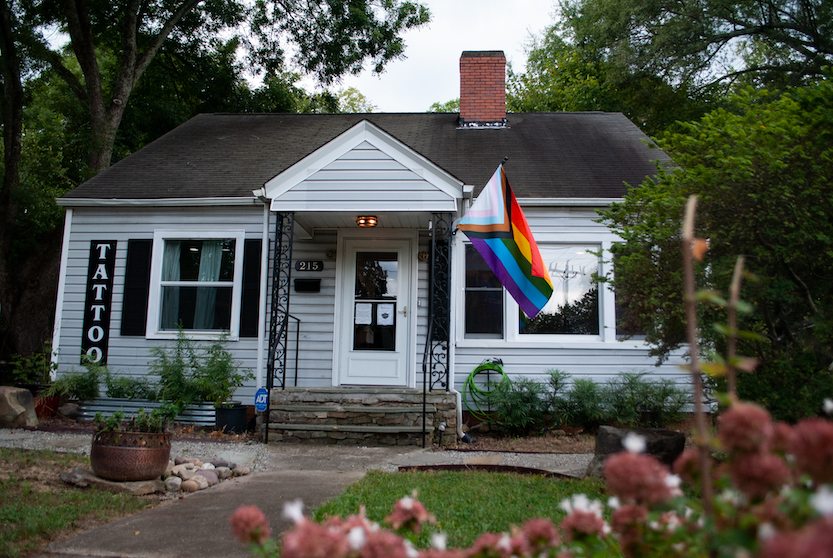
One of the safest spaces you will find in the Chapel Hill community exists where you might least expect it: in a tattoo shop. On the exterior, Ascension Tattoo on 215 N. Columbia St. does not give the appearance of a traditional shop with high anxiety and pointy needles. It looks like a home, and those who work there strive to make it feel like a home, too.
Ascension Tattoo first opened in 2012, and ever since has been regarded as a staple of the Chapel Hill community. The first thing one might notice when entering Ascension Tattoo are the vibrant flower gardens surrounding the property. An LGBTQ flag flies on the porch, signaling to the public that all are welcome regardless of race, ethnicity, gender, or sexuality. Customers who walk into the waiting room are then greeted by a living room adorned with plants. Art and jewelry for sale, made by the tattoo artists and other locals, hangs on the walls. A striking portrait of Maud Wagner, the first female tattoo artist in the United States, sits directly above the hearth.
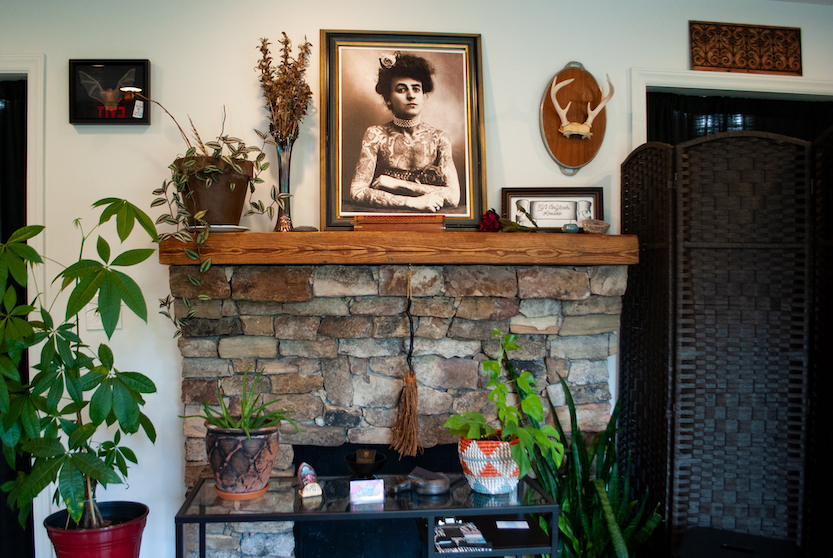
Behind the curtain that separates the artful waiting room and the shop is a team of five women. They all work to transform an industry that is typically indicative of pain into one of safety, comfort, and joy.
Shop owner and tattoo artist Meghan Magdalene began tattooing 10 years ago. After co-owning another shop, she continuously pushed to change local zoning laws to allow for Ascension Tattoo to inhabit its current location.
“I just wanted it to be a place that was safe for people both to work here and come get tattooed here,” said Magdalene.
Magdalene aimed to create a comfortable environment at Ascension Tattoo with her previous experience with gender inequality in the industry in mind. Because tattoos are typically geared more towards men, women have more difficulty with being accepted into the industry.
Magdalene said, “I wanted a safe space in the community for people to get tattooed, to exist inside of. There are too few safe spaces, true honest to God spaces where people will feel seen, heard, accepted.”
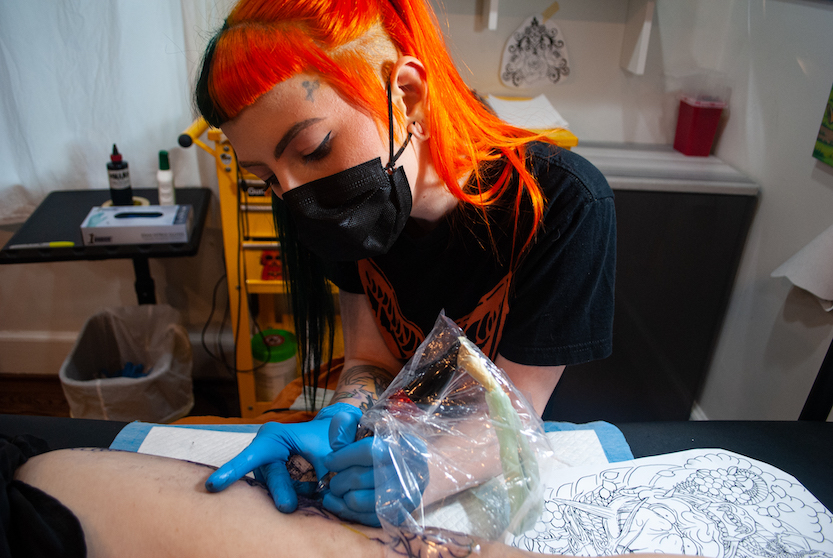
Tattoo artist Kelly Von Moses has also experienced this inequality firsthand. With a talent for tattooing neotraditional themes mixed with anime by using a stippling technique, she moved from Florida to Devon, N.C. four years ago. Ascension Tattoo was the first job that she stumbled upon when she arrived.
“I was told that because I was a female that it probably would not happen. And then every shop that I worked for pretty much treated me like I was only meant to be there because I was a female and I was attractive. I was actually scared to work for another man,” says Von Moses, “but this is where I go to get creative or just be by myself with my friends. My safe space.”
The all-female owned and operated shop also plays a major role in the LGBTQ community. Von Moses wants everyone to know that if they are tattooed by her, they will be treated like a person and not like a trend.
“You’re human, and we respect you. So if you have a preferred pronoun, we want to make sure you know that we care. We won’t misgender you, we won’t say your dead name, because, you know, we all care and we all have someone in our life that is going through something,” said Von Moses.
The mission of Ascension Tattoo extends to those of different cultural backgrounds as well. Hannah McCalip, a protocol analyst from Hillsborough, has been getting tattooed at Ascension Tattoo for four years. She has had five tattoos done by Magdalene that have been completed over the span of multiple appointments. McCalip is an Anishinaabe, the cultural group of Algonquin indigenous peoples of the Great Lakes region in the United States and Canada. McCalip had a tattoo of the Anishinaabe Thunderbird and Mishipeshu, the Anishinaabe water panther, touched up on her forearm by Magdalene on September 18.
“All the artwork that Meghan has done for me, she’s turned my tails and put modern spins on my culture,” said McCalip.
McCalip first chose Ascension Tattoo because Magdalene’s earthy, whimsical style best suited spiritual elements of the Anishinaabe culture. McCalip has gotten tattooed in some of the most painful spots, but she keeps returning to face the pain again and again – and she knows exactly why.
“It felt like a place where I could just be, and be me, and talk about anything under the sun and laugh. And there’s a huge reason I come back. And it’s because Meghan and every single person in the shop, they come over and hold my hand, or they hype me up, or they tell me stories when they see that I’m in pain,” said McCalip.
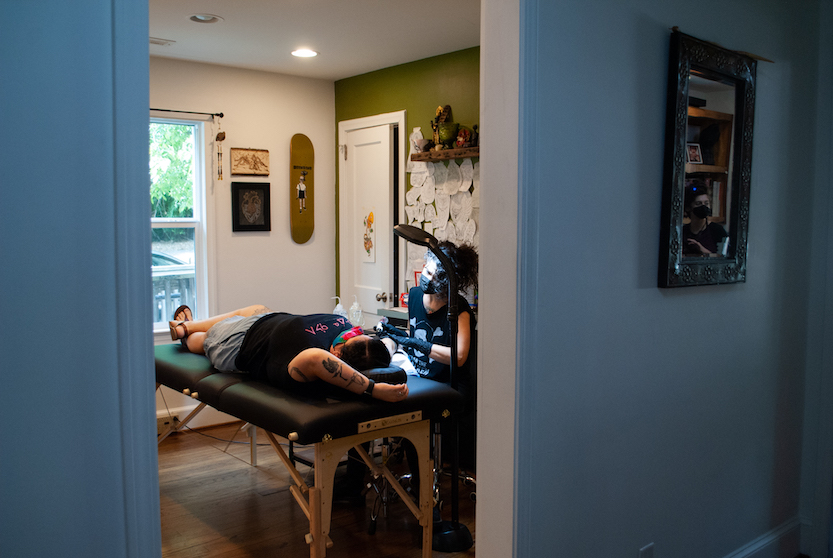
A personal touch is indeed critical to Magdalene, Von Moses, and the other artists at Ascension Tattoo. Von Moses typically starts her day by thoroughly cleaning her station. She then preps her tattoos by redrawing designs if needed, prints them out, and sets up equipment. Then comes the most important part of the tattooing process for Von Moses – bonding with the client.
Von Moses said, “We pride ourselves on giving people a good service and giving them what they’re wanting, we’re not going to just take your money and be like, this is what you’re getting. No, we like to actually have conversations with our clients and make sure they feel safe. We want you to be able to have the tattoo that you want, this is permanent. We treat everyone like we want to be treated.”
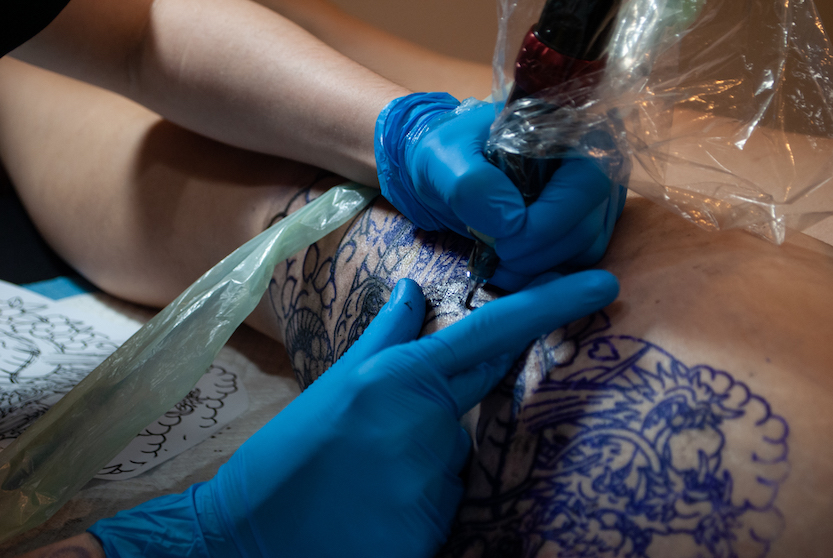
While the industry is still heavily male-dominated and discriminatory, Magdalene does not necessarily think that the all-female aspect of Ascension Tattoo is unique. Tattoo shops with female owners are growing in number across the Triangle area. However, she believes that this trend will help to turn a job known for its painful procedures and discomfort into a serious, yet inviting, profession.
“I think an influx of women in the industry has really helped that. I think it’s helped to keep people accountable for their actions. It’s helped up the professional standards of what it means to get a tattoo. I think we’ve just brought a level of professionalism and kindness and safeness to the industry that didn’t necessarily exist there before in all spaces,” said Magdalene.